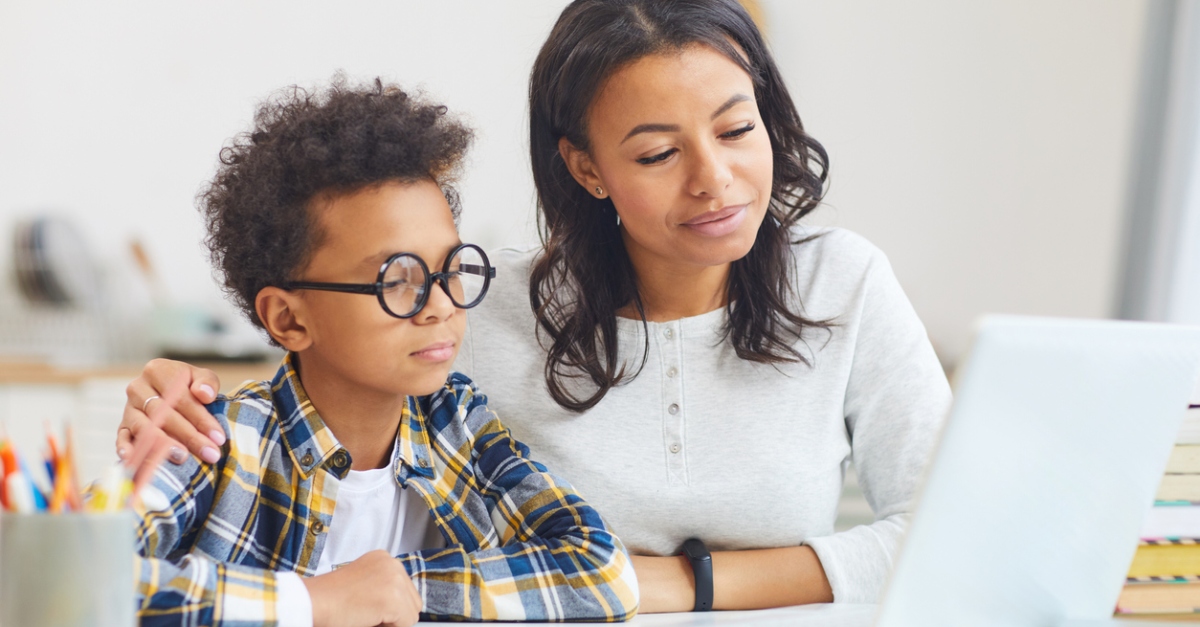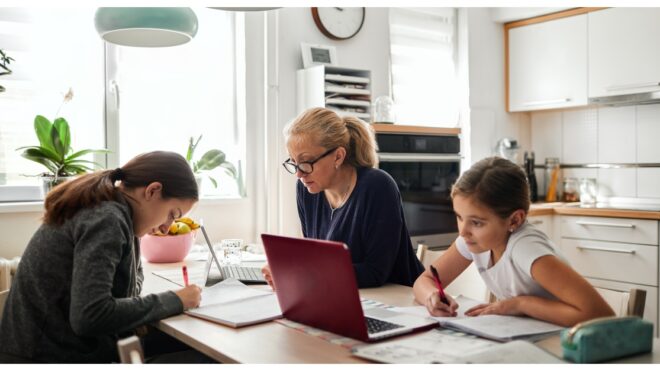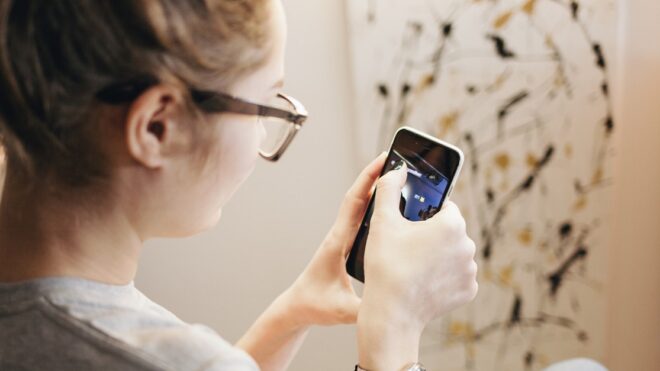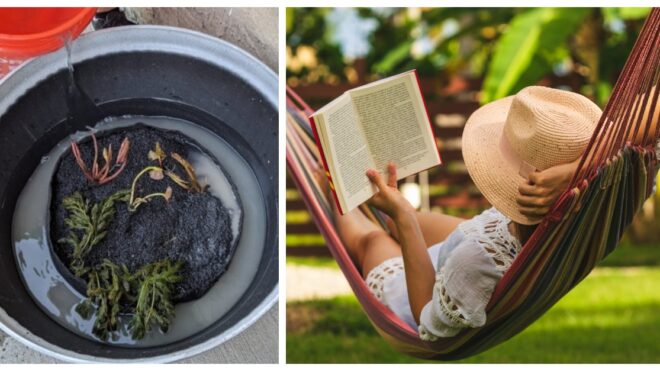
Whether your kids are returning to in-person learning or engaging in another round of distance learning, this school year will probably look different. It's a lot to deal with. Many parents are concerned about their children's social and emotional well-being after being away from a classroom for so long. They're also concerned for their own sanity, frankly. They're balancing worry with work demands and what's in front of them at home. Enter Messenger by Facebook. It might seem like an unlikely ally during these times, but thanks to Messenger Kids and Messenger Rooms, it's a major asset.
Messenger Kids allows children ages 6 to 12 to learn how to responsibly use tech in an environment easily monitored by parents. They can send messages, play games together, and video chat with goofy filters.
Messenger Rooms allows groups of up to 50 people to come together with a simple link. Even better, they don't have to have Facebook to join.
LittleThings spoke with Conor Hayes, director of product management for Messenger Rooms; Nitya Madhavan, head of marketing for Messenger Kids; and Ericka Sóuter, parenting partner for Messenger Kids, about how they see the products fitting into the school year ahead.
Back-to-school season is going to look different for most folks this year. Whether your kids are going back in person or are hunkering down for more distance learning, all parents can agree that kids' social-emotional well-being has taken a hit in recent months.
Messenger by Facebook hopes to make a difference with products that will help families and communities stay connected this fall and beyond.
"When I was introduced to Messenger Kids, it was when I was really struggling to find a way to keep my kids entertained and connected. When they called to ask for a partnership, I thought 'This is ideal, because my family already uses it,'" parenting partner Ericka Sóuter said.
Messenger Kids allows kids ages 6 to 12 to feel out "training wheels for tech." In other words, kids are allowed to communicate and play in a safe and interactive environment that parents have ultimate control over.
"Messenger Kids is a place for those younger kids before they're able to get into apps like Instagram and Facebook. This is the place where they'll have the fun experience with family and friends in a controlled environment that's really supervised by parents," explained Nitya Madhavan, head of marketing for Messenger Kids.
The app is global, available in over 140 countries across all devices.
"The sweet sauce for Messenger Kids is that we're made for kids. So we keep kids in mind and really want to maximize the experience for them to make sure that it's fun but at the end of the day, is still controlled by parents," Nitya added.
Parents set up their children's account and download it to their children's devices or whatever device they'll access it from. You need to use your Facebook account as a parent to authenticate the app, which helps make sure a parent is the one setting it up for a child, rather than another relative or older sibling. The app doesn't create a Facebook account for the child, however.
There are a number of ways kids can connect with family and with each other via Messenger Kids. You can link them to other friends already using the app as well as trusted adults on Facebook. You can also opt in to allowing them to friend people themselves, but you will still be able to oversee those actions from the parent dashboard.
Messenger Kids also takes into consideration that it's the first social app many kids will use. It comes with a pledge that parents and kids read and agree to together that lays the ground rules for what is and isn't acceptable behavior online. The pledge was developed in partnership with the Yale Center for Emotional Intelligence, along with youth advisers.
For many parents, it can facilitate additional conversations on what it is to be online and the responsibility of having a presence online. It also builds trust by allowing parents to check in on their children without having to go on their devices to do so. Kids can see what's shared with parents, too, in the interest of fostering transparency in online use that lasts beyond the age of 12.
Nitya compares it to a digital playground:
"In a real playground, parents take their kids there and let their kids play with other kids. Parents sit on the periphery and watch. They don't interfere or get involved in the play, but they're there to jump in when they need to. That's really what Messenger Kids is in the digital space."
There are three big components for kids to connect with others over. There's messaging, which is exchanging typed messages, stickers, and pictures during a chat.
Then there's video chat, complete with stickers, filters, and interactive games.
Lastly, there are activities, which include games and social-emotional activities that benefit kids without them even knowing it — "like a gummy bear vitamin," Nitya joked.
All the elements kids can use across these three features are created by dedicated design and creative teams and are geared toward children ages 6 to 12.
Children and parents both have the ability to report or block users within the app. Parents can also escalate to Facebook if anything seriously wrong transpires. Parents can see what images they've sent or received, so they can remove anything they don't approve of from the thread. There's also the ability to limit time spent on the app so that kids can use it only during allowed times or there can be a bedtime cutoff, depending on each family's needs.
Then there is Messenger Rooms, which will help parents and teachers stay connected this fall. Each Messenger Room allows up to 50 people to enjoy a conversation regardless of if they have a Facebook account. There are no time limits, either. All you need is the link to join a room!
"Messenger Rooms is a new product that we actually launched broadly in May. It's our attempt to make it easier for people to stay connected over video with the people they care about at a time where they can't physically be together," said Conor Hayes, director of product management.
"This classmate connection or even parent connection of students who are coming back to school at such a strange and different time is going to be extremely important, and we're trying to make that easy to do over video with Messenger Rooms," he added.
Messenger Rooms has put together useful guides to help parents and teachers come up with unique ways to connect during the back-to-school season. Some examples include hosting a virtual back-to-school night, scheduling virtual PTA meetings, and having virtual study and coffee break sessions.
Many adults are concerned about security when it comes to virtual gatherings, especially when a school-related organization is being represented. Thankfully, owners are able to have complete control over security settings. That means you can lock a meeting once all attendees are there and easily remove anyone not following the rules. The conversations had in rooms aren't monitored by Facebook, so you can speak as freely as you would in a private setting.
With the serious side of things covered, there's also lots of room for fun. Just as with Messenger Kids, you can liven up conversations with 3D backgrounds, filters, and more.
The Messenger Rooms team sees the opportunity to connect this way to be a huge asset. Many school teams, extracurriculars, and parent associations operate off a Facebook group. With Messenger Rooms integrated into groups, it's easier than ever to have the conversations you need to have with the people you need to have them with.
Messenger Rooms can even hold a live broadcast together. That makes it possible to open up virtual fundraising opportunities and other events to the larger school community easily.
Ericka is excited about how this will change the game for her family moving ahead.
"What I find with all the parents I talk to is that parents are struggling. We're trying to fill this gap that kids used to have where they could hang out with friends, have playdates, and go to camp," she said.
"Most kids, even if they're going to go back to the classroom, it's going to look completely different. So we still have that responsibility as parents to make sure they're connected and having fun with their friends … It's not the same as playing tag, or playing house together with a friend outside or playing on the monkey bars, but really at this time, this is the next best thing."
The guides help you facilitate connections with your children in a step-by-step way. Ericka's looking forward to exploring virtual lunchtime and recess when her kids go back to school.
"We have to re-create these moments for our kids because they're the most fun that kids have all day," she noted.
"They don't have that right now, it doesn't exist. Even if they're in classrooms, they're 6 feet apart and at their own desks or pods. There isn't a lot of room for interaction."
Ericka has tried out virtual playdates with her younger son: "My son can be exuberant sometimes and sometimes he just sits there. We use the guides to say, 'Okay here's the plan, here's what you're going to talk about today.'
"It goes on to all other kinds of things, but sometimes it gets people warmed up like what adults use icebreakers for."
Her older son has also joined in on the fun. They're planning a Messenger Rooms 13th birthday for him, where he'll be able to see family and still have fun with friends.
Ericka has even enjoyed her own connections with Messenger Rooms and her group of mom friends. It's a welcome breather and a reminder to carve out some time for herself. "I have a cocktail hour with my mom friends once a week," she shared.
"We hang out and we chill out and complain and laugh. We talk about everything from reality show craziness to politics to whatever we want."
Though Messenger Kids and Messenger Rooms are great fun for everyone, Ericka believes they'll lighten the load for many parents in many different regards this year.
"There's something that we get from social interaction. We learn how to compromise, we learn how to deal with complex emotions. We learn how to resolve complex in person," she explained.
"Our kids don't realize that's happening when they're at school all day, arguing over who gets the ball at recess or what game they play next, but that's what's happening and that doesn't exist anymore. We have to re-create those moments for our kids virtually."
"I've talked to parents whose aunts will have a reading hour with nieces and nephews. Grandparents will play games with their grandchildren over the application. It relieves a little bit of stress and pressure from parents," she noted.
"We're super worried about everything, getting sick, finishing our workloads, how to take care of our kids, making sure our kids feel loved and cared for, and in that sense, it makes kids feel loved, feel included, and it makes them feel connected. In that way, it relieves a lot of stress.
"It's taking little moments and filling up their emotional needs."
Ericka also admits that in leaning on family to take some of that time and build some of those connections, she feels less guilty about the added amount of screen time in their day.
"I've read every study, talked to every expert. There are all these warnings about how much time a kid should spend online. Well, that's kind of blown out the water because they have to learn online and interact that way," she said.
"So I feel like this isn't just mindless use of time. They're doing something, not just watching a show or searching for videos. This is actually giving them something constructive to do. It helps take away a little of the guilt of how they spend their online time because there's more meaning, there's something that they're getting out of it that's important to them."
"As a parent, sometimes I feel a little desperate," she shared.
"I know other parents are going through it but me, in my apartment in New York City with my two kids driving me nuts, it kind of feels like you're alone a little bit. Having those instant ways to connect my kids to other people takes a little bit of the pressure off of me. I think that makes everyone happy because I'm not so tense and testy, so we all benefit."







